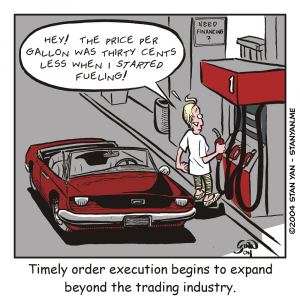In systematic studies, psychologists have discovered that peak performers have a true passion for what they do. Whether it’s art, sports, or business, the folks at the top are not primarily motivated by fame, glory, respect, or status. They are driven by the pure love of the game.
Winning traders, similarly, have strong interests in the markets, and this passion is the driving force that puts them at the top, year after year. But many novice traders are drawn to the markets so as to meet deep-seated psychological deficits and needs. Trading with these motives often leads to disastrous consequences. A briefcase study of Ray, a novice part-time trader, illustrates the point. Read it, think about it, and consider whether or not you can relate to it.
Ray was a successful engineer who traded the markets for 10 years, but he never had a winning year. In his worst two years, he lost 95% of his yearly salary. When asked about his trading progress by friends and family, he enthusiastically told them about how thrilling the markets were, and how he liked to trade so as to feel that rush of excitement.
He also spoke of how the riches he planned to make trading were going to help him buy a big house in the hills overlooking the city, and gain the respect of his friends and family. As you might see, Ray had ulterior motives for trading: he was out to gain status, respect and approval. With each trade, he put his self-esteem and his worth as a person on the line.
He also tried to use the markets to ease his boredom. He didn’t love trading in its own right but used trading as a means of satisfying powerful psychological deficits. Such an approach to trading can produce catastrophic results, as it did in Ray’s case. It’s vital that you evaluate the true motives that lie behind your trading and make sure you are doing it because you love it, like the intellectual challenge and feel fulfilled just because you trade.
Ray clearly had psychological needs that should have been addressed before embarking on a trading career, but it’s interesting to note that in other areas of his life, Ray was a successful person. He was considered a top-notch engineer and a skilled athlete.
He loved playing sports, and unlike trading, he didn’t care if he won or lost; he just loved to play. It was enjoyable, and in contrast to trading, he never talked about how he had to prove himself to others or how he hoped to earn bragging rights. If Ray could have just applied the carefree approach he used to succeed as an athlete to his trading, he would have been much more successful. If he would have just traded because he enjoyed it, rather than focusing on the respect and approval he wanted as a result of it, he would have probably had several profitable years.
Can you relate to Ray’s predicament? What motivates your trading? Is there an enjoyable skill that you have honed in which you take a carefree and focused approach? Try applying this carefree and focused approach to your trading. A key ingredient to trading success is the proper motivation: Be motivated by the intellectual challenge. Follow your passion for trading. Do it because you love it.


